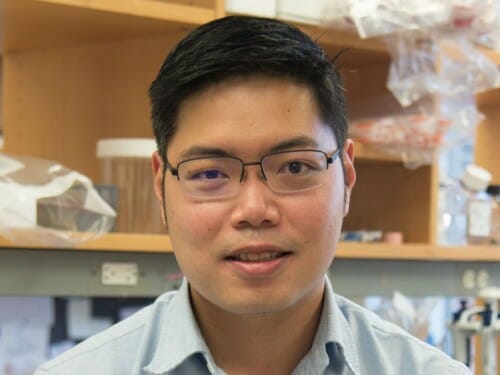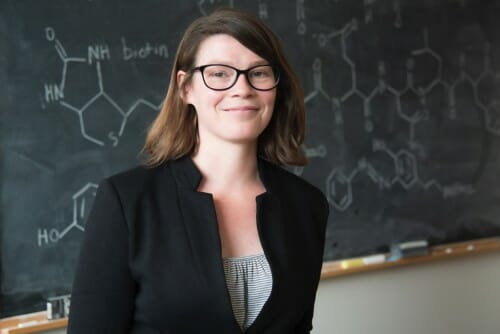Two UW biochemists look to unravel secrets and techniques with NIH New Innovator Awards
With assist from the Nationwide Institutes of Well being 2022 High Risk, High Reward New Innovator Awards, College of Wisconsin–Madison biochemistry professors Ci Ji Lim and Amy Weeks are pursuing a few of their most unconventional concepts about repeating DNA sequences and the best way cells reorganize proteins as they obtain indicators from exterior their partitions.
Greater than half of the human genome is made up of repetitive sequences of DNA. Lim studies telomeres, repeating sequences of DNA that seem on the ends of chromosomes, together with how telomeres are maintained and arranged and the way they replicate.
Analysis up to now has primarily centered on the size of those repeat sequences — shorter telomeres have been related to ageing, whereas each shorter and longer telomeres have been linked to sure cancers. However Lim hopes to vary that.

Ci Ji Lim
Based on Lim, analysis means that telomere size is just one variable that scientists may think about of their quest to grasp well being, illness, and fundamental telomere-related organic features. How sure proteins bind alongside this repetitive DNA sequence may have essential implications that scientists don’t but perceive.
“It’s time now we have an impression of what the distribution of proteins alongside repetitive DNA sequences are, and the way this adjustments over completely different telomere states. Presently, it’s a black field,” Lim says. “The instruments we will likely be growing, along with others, may breach this barrier and permit us to grasp this method, synergizing a complete discipline of chromosome biology analysis at repetitive genomic sequences.”
Utilizing the gene-editing instruments and superior DNA sequencers, Lim plans to review the association of proteins alongside telomeres to grasp whether or not their location and order are essential.
“I believe this work may present the lacking connection between previous research that use overly simplified telomere techniques and the advanced protein-DNA interactions which might be taking place at telomeres in cells,” Lim says.
Weeks’ research group attracts from numerous disciplines, together with protein engineering, chemical biology, cell biology and proteomics — the examine of enormous units of interrelated proteins — utilizing a bunch of various instruments and applied sciences, to map the dynamics of proteins in people and the way these proteins reply in time and house to indicators from exterior cells.

Amy Weeks
A subset of her analysis includes deciphering the organic features of post-translational modifications, that are the chemical adjustments that reprogram how cells are organized after a protein has been produced. These adjustments occur on a continuum of time scales, on the order of seconds to days relying on the organic indicators concerned.
There are lots of of hundreds of post-translational modifications, however scientists solely know the features of some thousand. Weeks plans to develop automated instruments that may be utilized throughout the complete set of proteins in people and can enable scientists to develop focused hypotheses about what completely different post-translational modifications do.
“I believe you’ll hear some folks within the mobile signaling discipline say that many post-translational modifications are simply bystanders, that they don’t have an essential perform. I don’t suppose that’s true,” Weeks says. “I believe it’s analogous to again when the human genome was first sequenced. Individuals used to say that 90% of the human genome was junk DNA, and now we all know that’s not true. I believe one thing related is true of those protein modifications.”
As soon as developed, Weeks’ instruments may assist scientists perceive how proteins transfer between compartments in cells in response to the indicators they obtain and the way that pertains to perform.
Grants to Lim and Weeks are amongst 71 researchers receiving New Innovator Awards this yr. The awards, created to assist unconventional approaches to main challenges in biomedical and behavioral analysis, present as a lot as $1.5 million over three years for unusually revolutionary analysis accomplished by early-career investigators.
Learn extra concerning the New Innovator Awards on the NIH website.
Source link
